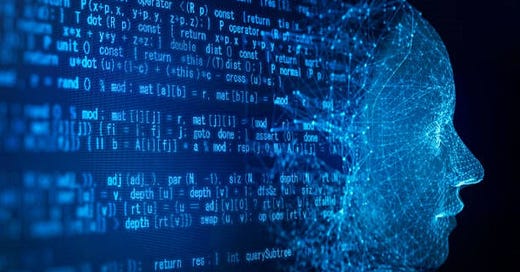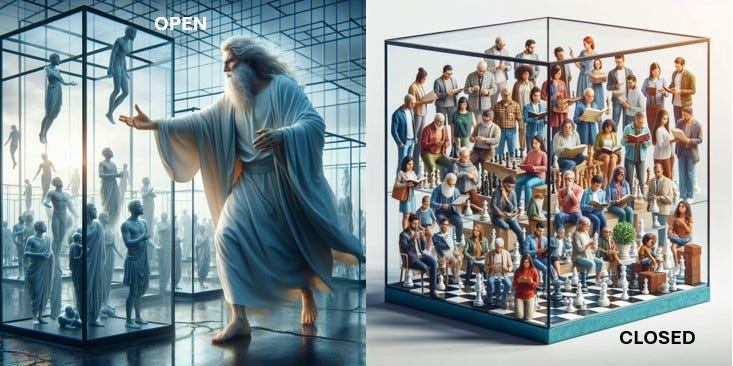I have written a few times in the past about the brave new world of artificial intelligence and whether I am to be replaced by HAL.
Count me as a strong doubter in the potential of this technology which puts me in the company of other substack authors like Nick Potkalitsky,
and Erik Larson,
who express similar views from a deeper technical understanding.
The software, it seems to me, is not living up to its hype and perhaps will never do more than replace some marketing and software coding jobs. It will be an enormous irritant for teachers and professors who assess student progress based on essays, and it will be of great assistance to those who work with words. For people like me, who think stick men with bent knees is high art, the current large language models (LLM) will set that bar considerably higher. People who know about this stuff tell me that movie production will soon be in the hands of creative, if amateur, graphic artists.
In my efforts to understand this brave new world, I have read the bold predictions of Ray Kurzweil and others regarding the imminent arrival of stunning artificial general intelligence which will be built on the magic of large language model (LLM) processing. To believe Dr. Kurzweil’s predictions, we are close to the singularity, that point when machines begin to outdo humans in both creativity and productivity.
But are we nearing the singularity? More to the point can we ever arrive at it? The reason that I am a fan of Dr. Kurzweil is not because I am giddily anxious over the imminent arrival at the singularity but because he was honest about the philosophical nature of his argument for a singularity. And he candidly states that if his philosophical assumptions are wrong then we needn’t worry about a singularity in 2049 or at any other time. That impressed me.
“Philosophical assumptions” screams “worldview” and that is what I try to dedicate this substack to. After a great deal of ruminating over where Dr. Kurzweil and I part ways, I conclude that we have fundamental differences in worldview. This is not to cast aspersions on Dr. Kurzweil. I happily acknowledge that his IQ is undoubtedly superior to my own, but that is the nice thing about worldview differences. They aren’t driven by differences in intelligence but by differences in the interpretation of reality.
Dr. Kurzweil, as I read him, believes in evolution which is founded upon a belief that the universe is a closed system and so creation must have been ex nihilo – out of nothing. That is a faith statement that takes me well beyond where I am comfortable going. I believe in an open universe that allows the materials of creation to have come from outside the system – creation from something. You may argue that my position doesn’t take me very far because I haven’t defined “something”. But something is more than nothing so it is far enough for me.
This will be recognized as the philosophical basis for the Intelligent Design hypothesis. “Here I stand, I can do no other,” to quote a famous renegade. Based on modern information theory and the shockingly low probabilities of evolutionary occurrence, I think the hypothesis has much to recommend itself. Darwin, for all of his arm waving, had his own doubts about the probabilities of an evolved eye. Blind people tend to get eaten in a primitive environment so the time for evolution must have been dramatically foreshortened. Critically so, it seems to me. Like down to a couple of days.
Evolution and creation ex nihilo are based on the notion that information can be added to a system purely based on time and chance through mutation or other unguided system. This flies in the face of the Second Law of Thermodynamics which posits that disorder in the universe will increase as mass is converted to energy and then used (increasing entropy). Lord Kelvin wondered why heat does not spontaneously flow from a colder to a hotter body. Where, outside of Darwinian assumptions, do we find systems becoming more complex in the absence of exogenously added complexity and new information? The increased complexity and new information must come from outside of the system. In 1980, Stephen Jay Gould boldly pronounced that the Modern (neo Darwinian) Synthesis was “effectively dead.” And no intelligent design aficionado, he. I think he was correct.
But it is not my purpose to debate the open system versus closed system hypotheses of how the universe began. Rather, my purpose is to point out that this open/closed issue is the point of divergence between my worldview and the worldview of people like Ray Kurzweil. And because we have different worldviews, we arrive at different conclusions.
Dr. Kurzweil and others believe that artificial intelligence programs will some day become artificial general intelligence programs that will be able to generate creativity and information endogenously, from within. When the speed and complexity of machine computation exceeds that of the human brain, the machine will be conscious and thus competitive with human consciousness. Game over Homo Sapien scumbags!
Belief in machine consciousness, it seems to me, is tantamount to creation ex nihilo. Just as I cannot believe in creation ex nihilo so I cannot believe in machine consciousness ex nihilo.
For the sake of argument, let’s say that I am right that machines cannot endogenously produce consciousness. Nevertheless, won’t improvements in computational speed and complexity driven by manmade inputs result in machine consciousness? This is the subtext of Kurzweil’s argument, after all. He calculates the decreasing half-life of machine development improvements and then projects to a point in the near future when the machine outdoes the brain. It’s a beguiling argument. But again, he and I are split by differences in worldview.
The difference this time is based on our understanding of consciousness. As I understand his argument, he holds the view that consciousness results from the speed and complexity of computation. The human brain is well designed for both speed and complexity, and it is conscious. Therefore, once machine speed and complexity match that of the human brain, the machine must also be conscious. One is tempted to ask who is responsible for the design of the human brain, but I said I wouldn’t go there.
His view is based on a mechanistic view of consciousness which I don't think withstands scrutiny, at least not my scrutiny. The fact is, no one knows what consciousness is or where in the body it resides. The possibilities range from the metaphysical – a spirit or soul which resides somewhere inside or outside the body - to the physical – chemical interactions at the synapses of the brain - and a great many other theories in between.
I have no clue as to these matters. In fact, as I inch ever closer to that other singularity which, in faith, I believe occurs at the point of death, the more I am convinced that many machines are already computing faster and with more complexity than my tired carcass of a brain. Where is your singularity now, Dr. Kurzweil? On whose brain is it defined? Clearly not mine.
All this to say that my belief in the fatuity of artificial general intelligence rests on a worldview that requires an open system in the universe for the world to make sense. I don’t think that the mass that constitutes our universe was created from nothing and, by extension, the machines that are powered by artificial intelligence will only grind down and one day fall prey to the blue screen of death (I date myself). They will not generate and increase their own complexity by adding information that they do not currently have. All this is based on a philosophical (i.e. not scientific) hypothesis that is at odds with the philosophical (i.e. not scientific) hypotheses of Dr. Kurzweil and others.
It will be interesting to see how things unfold. It doesn’t look good for their team at the moment.
************************
Having said all this, I have used a few of the LLM programs and am impressed by the “gee whiz” speed and the relative accuracy of responses. My computer has not yet had the audacity to hallucinate but I am ready with a bucket of cold water if it does. The LLM technology is both quantitatively and qualitatively impressive in my view.
Lately, however, I notice that a lot of the references listed by the LLM are Wikipedia entries. Hmmm… I donate a lot more than $2.13 to Wikipedia each year and am a little ticked to find that I am also feeding Grok and Chat GPT among other programs.
Maybe I will just stick to Wikipedia and be responsible for my own mistakes. I do like the improvement in my articulated stickmen, though, so will continue to play with the image generators which created the cool open-closed system graphic above.







Once again, Murray, you have put your finger on the sore spot of those who insist on "machine consciousness ex nihilo." Without citing any references (I, too, am working with an aging, slowing brain), my memory is that biological research is more and more revealing that consciousness is not a result of brain functioning, that it lies elsewhere and that the brain is perhaps a connecting point between the body and the mind. Kurzweil, for all his brilliance, is a desperate man (just google "Kurzweil vitamin regimen"), and desperate men don't think too well (see "clutching at straws").
Hi all
Plenty of apparently unintelligent creatures are alive, notably single-cell microbes (and atheists — just kidding), and they all have sufficient consciousness to respond to external stimuli. There's no reason to believe that a machine which calculates with unprecedented speed will come alive any more than a vacuum cleaner which sucks with unprecedented power. Why do some folk focus on intelligence as the crucial factor in consciousness? In part because humanity is infatuated with its own exceptional intelligence, I would guess. Another factor is glaringly obvious: no science has yet come up with even the most feeble empirically verifiable explanation as to how life and consciousness did come to exist within this universe.
Merry Christmas